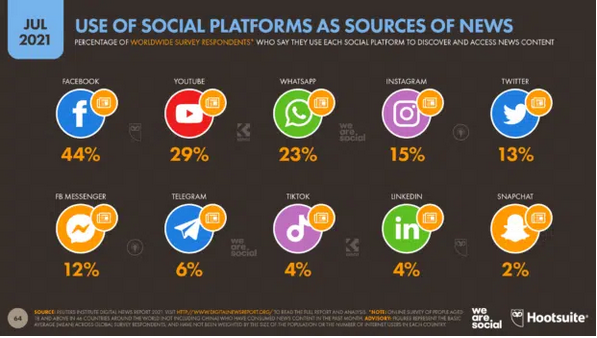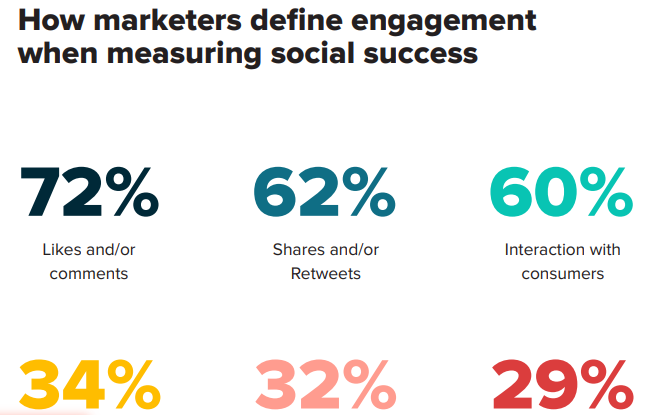 By Connor Fraser
By Connor Fraser
March 11th,, 2022
BURLINGTON, ON
There is a growing body of evidence suggesting that how we interact with the internet, and social media in particular, is disastrous from a health perspective.
Firstly, several studies have noted the link between social media use and depression. A 2018 study released in the Journal of Cyberpsychology, Behaviour and Social Networking demonstrated that every one-point increase in passive social-media use was associated with a 33% increase in depressive symptoms.
 Secondly, many have identified links between social media use and reduced memory and attention. Research published by the Gerontological Society of America reported that “on days when social media use was high, individuals reported more memory failures” and furthermore that “higher previous-day social media-use was associated with more memory failures on the subsequent day.” The researchers hypothesize that a key mechanism for memory failures is attentional disengagement, whereby “individuals using social media are less engaged in real-world activities…and may not encode these events and experiences as deeply as they would otherwise.”
Secondly, many have identified links between social media use and reduced memory and attention. Research published by the Gerontological Society of America reported that “on days when social media use was high, individuals reported more memory failures” and furthermore that “higher previous-day social media-use was associated with more memory failures on the subsequent day.” The researchers hypothesize that a key mechanism for memory failures is attentional disengagement, whereby “individuals using social media are less engaged in real-world activities…and may not encode these events and experiences as deeply as they would otherwise.”
Late in 2021, Facebook made headlines by announcing it would re-brand itself as ‘Meta’ signalling CEO Mark Zuckerberg’s intention to play a key role in developing the ‘Metaverse’: The next generation of the internet, enabled by technologies such as augmented reality (AR) and virtual reality (VR). Instead of clicking on webpages and newsfeeds, users will eventually navigate a digital world similar to the physical world, complete with their own avatars, and digital property such as clothing and land.
Imagine a world where a significant number of people live within a tightly controlled digital experience, rarely going outside or interacting with their neighbours. Companies such as Meta and Microsoft are betting big on people spending a lifetime online. But regardless of how scary this potential future looks like, many (particularly young people) are already living in a pseudo-metaverse.
For example, a 2019 article reported that children under age 14 spent nearly twice as long with their tech devices per day as they do with their families. These transformations are having profound impacts on our memories, and ability to pay attention and focus – which has serious implications for the future productivity of our economy, democracy and ability to confront life’s challenges. I argue that social media is already causing serious harms to society – and should be carefully regulated if we hope to prevent these harms and stop the ‘Metaverse’ from magnifying them to a terrifying level.
![]()
Consider that an incredible amount of resources have been dedicated towards designing social media and metaverse technologies to be maximally addictive. Former engineers at Google and Meta admit that their apps exploit the same psychological susceptibilities that makes gambling so compulsive, such as variable rewards. Faced to confront the latest techniques in psychology and advanced machine-learning algorithms, it’s no wonder why many find themselves continually attached to their phones – it’s not your fault!
Neither is it uniquely the fault of social media companies, who to my knowledge have not been accused of breaking government laws and regulations in any major way. The role of the firm has always been to generate profits for shareholders – and implicitly value for their customers. Contrastingly, it is the role of the government to identify activities that generate negative externalities and positive externalities – and regulate those activities which produce negative externalities (such as pollution) and fund those activities which produce positive externalities (such as public education).
The current relationship with social media is such that people receive an onslaught of messages from numerous platforms and numerous devices, and find themselves very quickly “toggling” between tasks, unable to consistently focus on any one task for greater than 3 minutes, on average. This toggling is rapidly eroding the capacity for long-term, strategic focus – precisely the tools that people need to set goals and achieve anything meaningful in life.
 It is worth noting that social media is not entirely bad, and there are positive aspects to these technologies. For example, in a report commissioned by PEW research, many teens reported that access to social media played an important role in overcoming difficult life experiences. These benefits were magnified for vulnerable populations, such as youth from households with annual incomes less than $30,000 – suggesting that social media offered critical support group that wouldn’t have otherwise been available or affordable.
It is worth noting that social media is not entirely bad, and there are positive aspects to these technologies. For example, in a report commissioned by PEW research, many teens reported that access to social media played an important role in overcoming difficult life experiences. These benefits were magnified for vulnerable populations, such as youth from households with annual incomes less than $30,000 – suggesting that social media offered critical support group that wouldn’t have otherwise been available or affordable.
Moreover, the majority of teens responded that social media enables them to spend time with their friends on a daily basis, through free messaging and video chatting features. During the pandemic, these services have undeniably played an outsized role in enabling people to remain in touch while in-person opportunities were limited. Additionally, some have argued that powerful social media algorithms provide a great service by connecting people with products that are optimally tailored to their needs. To cite one example, last year I received a Spotify advertisement for the language program “Learn French by Podcast” which I subsequently subscribed to and got a huge amount of value from.
While it is clear that social media has benefits to offer when used appropriately, I think it is important to recognize that certain use patterns can be incredibly destructive – especially when people turn to aimless scrolling and passive searching for instant validation. To prevent harms from further accumulating amongst young people, and also to prevent these harms from accelerating as the metaverse becomes more potent, the government must develop an action plan to leave people in control of their relationship with social media.
 Any action plan should focus on increasing healthy behaviour and preventing harmful behaviour. One strategy might include imposing regulations on tech giants that make it mandatory for all apps to periodically (i.e. once per month) provide users with a “time-spent” report, remind them about healthy-use habits, and remind them of in-app features that exist to turn-off notifications and block content. Another strategy might include devoting greater government resources to educate citizens about the circumstances under which social media use is harmful. Integrating compulsory modules into the elementary and high-school curriculum about healthy social media practices would be a good start.
Any action plan should focus on increasing healthy behaviour and preventing harmful behaviour. One strategy might include imposing regulations on tech giants that make it mandatory for all apps to periodically (i.e. once per month) provide users with a “time-spent” report, remind them about healthy-use habits, and remind them of in-app features that exist to turn-off notifications and block content. Another strategy might include devoting greater government resources to educate citizens about the circumstances under which social media use is harmful. Integrating compulsory modules into the elementary and high-school curriculum about healthy social media practices would be a good start.
Two final points to add. In order to proceed with meaningful action, more academic research of much greater rigour, needs to be conducted. The study cited above from the Journal of Cyberpsychology, Behaviour and Social Networking made use of an online survey where participants answered subjective questions about their experience with social media and any subsequent feelings of depression. This is hardly sufficient evidence, nor the type of decisive evidence I would want to have in my arsenal to push back against big tech. The calibre of academic scholarship in this field needs to improve dramatically in order to provide a clear rational for action that will find sustainable support amongst the majority of citizens.
Finally, I wonder if there is an appetite to explore different business models. One of my professors at the Munk School of Global Affairs & Public Policy, Daniel Breznitz, once commented that “if you’re not paying for a service, you’re a product, not the customer.” In the world of Facebook, Instagram, and Snapchat, users pay no subscription fees and should therefore think of themselves as “products”.
In order to generate revenues, these business models must create value for their actual customers (i.e. advertisers) by keeping us online for as long as possible. Altering the model by introducing a subscription fee could allow companies to generate value for users as their primary customers, and perhaps abandon the need to aggressively target us with manipulative techniques.
Regardless of what action the government decides to take, this file requires some movement, and I’m shocked that Canadians have received limited leadership from elected officials until now. With continued complacency we are sleepwalking into a future health and economic crisis of titanic proportions.
 Born in Hamilton, raised in Aldershot, Connor Fraser attended Waterdown Montessori School, Glenview Public School, Burlington Christian Academy and Aldershot High School. He earned a BASc. in Engineering Science and a major in Electrical and Computer Engineering at the University of Toronto. He then worked as a member of the technology development team at Microchip Corporation (North San Jose, California) where he contributed to the design of computer memory for FPGA chips.
Born in Hamilton, raised in Aldershot, Connor Fraser attended Waterdown Montessori School, Glenview Public School, Burlington Christian Academy and Aldershot High School. He earned a BASc. in Engineering Science and a major in Electrical and Computer Engineering at the University of Toronto. He then worked as a member of the technology development team at Microchip Corporation (North San Jose, California) where he contributed to the design of computer memory for FPGA chips.
Connor volunteered for the U of T Human Powered Vehicles Design Team as a machinist and led the design of a rollover detection system for high-speed tricycles. During the summer of 2013, 2015 and 2017, Connor lived in Quebec thanks to support from the YMCA Student Work Summer Exchange, and the Explore Program & is decently proficient in spoken French.
He is currently enrolled in the dual Master of Global Affairs and Master of Business Administration program and is concurrently a CFA Level 2 candidate. He is a Senior Producer with “Beyond the Headlines”, a weekly public affairs radio show that airs on CIUT 89.5FM















Couldn’t really agree more. The real question is does commenting do anything positive except satisfy the commenter. I don’t think that I’ve often been convinced by someone else’s comments to substantially change my own viewpoint. And the churn, the ridiculous pace, the continuous drone of the ‘always commenters’ and the general lack of respect for the opinion of others marks all of social media, Twitter being the worst IMO.
Agree that we would be far better, more educated and safer without it. The spread of disinformation has and is causing huge harm around the world. When I read, even in gazette, comments by people whom I thought would care about protecting vulnerable people from harm, spewing about rights and individual choices as if in an airborne deadly virus our actions or non-actions don’t affect others, I’m gobsmacked. What is happening to society where we don’t consider first the greater good? Sure glad those who lived through the first two world wars and actually sacrificed did so or none of us would be here today.
And we aren’t the ones making it political, the politicians have done that since day 1. I deleted Facebook a while ago since I was so sick of seeing the BS by said politicians (ps: campaign promises mean nothing so please stop making them) and the photo ops and the oblivious “look at us having dinner” posts ad nauseum. But I’m addicted to Twitter and need to get off it. Really I’d like to toss my phone and laptop off the pier. I vowed months ago to stop commenting here too and regret that I just broke it. Will try again to keep that vow. And to the person who left the anonymous vulgar threatening letter in my mailbox in response to a prior comment I made here, months after the fact, that isn’t why I stopped commenting here. But you did demonstrate just as the social media posters do that society really is going badly wrong. Social media I believe is a big reason why.